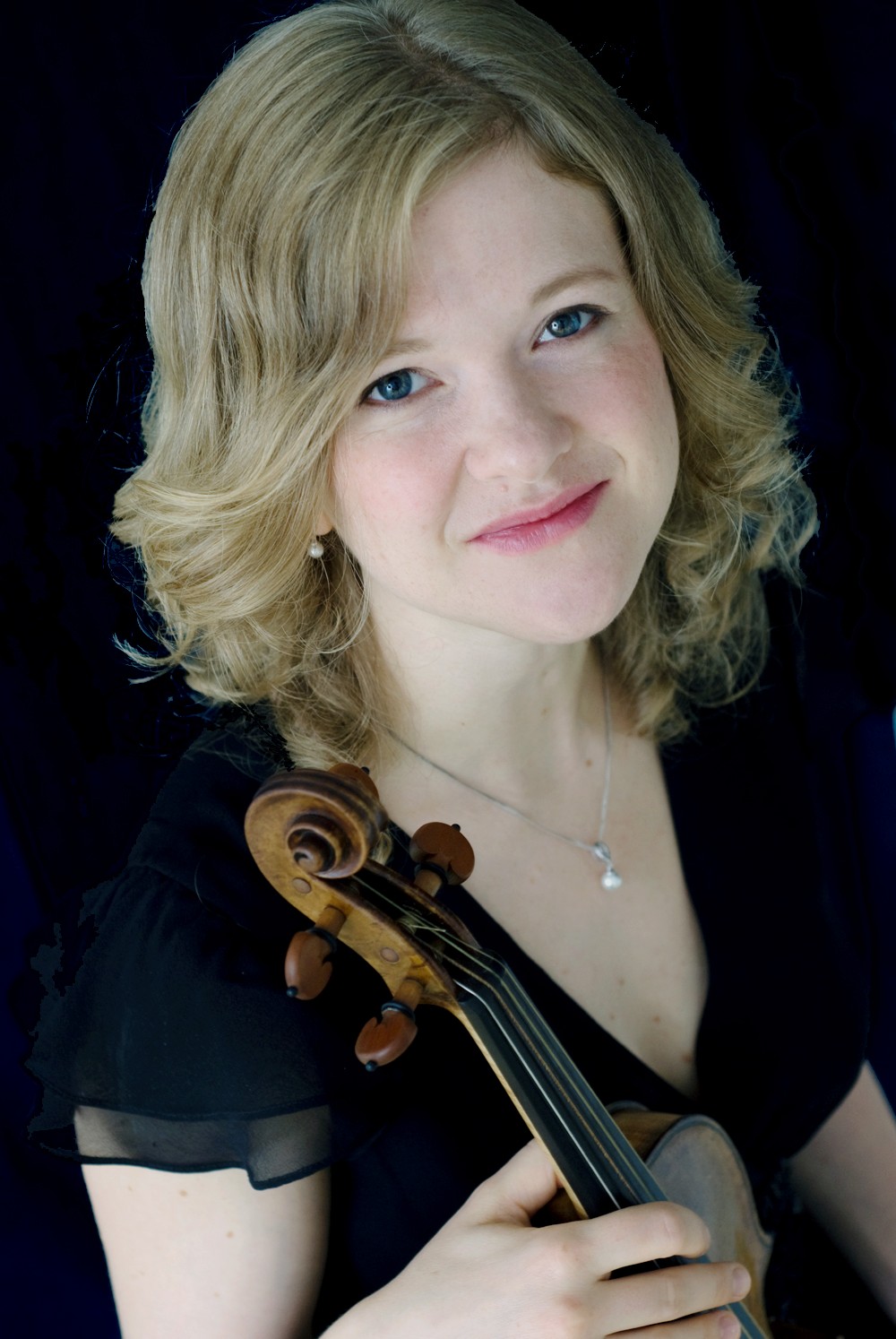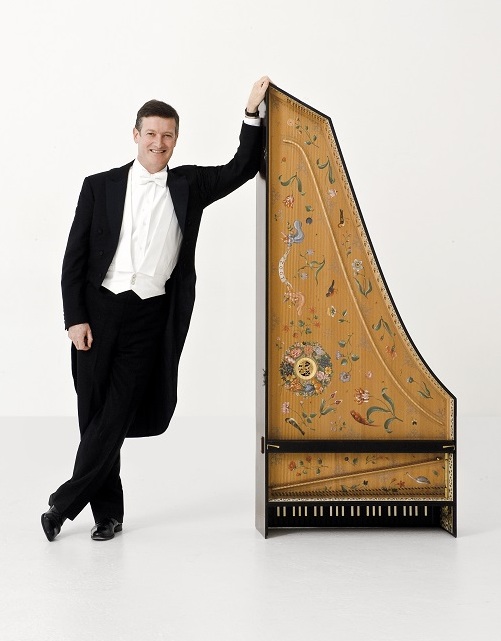Singing students from the Guildhall School should have been issued with a three-line whip to fill the inexplicably half-empty Milton Court concert hall for last night's charmer. After all, every musician, and not just sopranos, should know that this is how it ought to be done. True, an effervescent personality like Lucy Crowe's can't be simulated. But every other respect of her stunningly sung and varied Mozart can be aspired to: the relaxed, natural stance (and in this instance, knowing how to play a recalcitrant shoe heel for comedy), knowing what to do with the hands, how to execute coloratura as spine-tingling expression, not mere display, how to spin long lines and to colour the music according to the situation, with the right dramatic looks and widening of the eyes to match.
True, this was culinary Mozart of the sort to make E F Benson's Lucia and Georgie affectedly exhale, two-thirds of it composed in his teens, but as with Donizetti and Bellini, when you have supreme stylists in charge, it all commands attention. There are no better period-instrument players around than Harry Bicket's band, and though the dry acoustics didn't help them out in the way that the Wigmore Hall would in the frothiest of Mozart's early Divertimenti, the D major K136 with the already-vintage humour of its six-note finale kickoff, the pleasures came thick and fast. Mozart's inner string lines were full of life and interplay, runs clean and bright.
 The orchestral counterpart in the concert's second half, the A major Violin Concerto K219 with its rollicking "Turkish" rondo episode, brought another pleasure of collaboration. The English Concert's leader, Nadja Zwiener (pictured left), may not be a born soloist with the kind of panache that Isabelle Faust brought to the even slighter G major Concerto at the Proms, and in her first entries she had a bit of an intonation problem as well as less than perfect ornamentation. But the Adagio shone with such a rare consonance between violinist and orchestra, the sort of thing that star players flying in for one rehearsal can't achieve, and by the finale, with aforementioned romp both clearly articulated, with none of the usual rushing, and laugh-out-loud exuberant, we were back to the level of what Crowe had already achieved with Bicket and co (the conductor-instrumentalist pictured below by Richard Haughton).
The orchestral counterpart in the concert's second half, the A major Violin Concerto K219 with its rollicking "Turkish" rondo episode, brought another pleasure of collaboration. The English Concert's leader, Nadja Zwiener (pictured left), may not be a born soloist with the kind of panache that Isabelle Faust brought to the even slighter G major Concerto at the Proms, and in her first entries she had a bit of an intonation problem as well as less than perfect ornamentation. But the Adagio shone with such a rare consonance between violinist and orchestra, the sort of thing that star players flying in for one rehearsal can't achieve, and by the finale, with aforementioned romp both clearly articulated, with none of the usual rushing, and laugh-out-loud exuberant, we were back to the level of what Crowe had already achieved with Bicket and co (the conductor-instrumentalist pictured below by Richard Haughton).
Our great soprano didn't make it easy for herself, plunging in with Aspasia's ferocious first aria in Mitridate re di Ponto. If Crowe had been singing this role rather than the less rewarding one of seconda donna Ismene at Covent Garden, that musically rather ordinary evening might have come up to the mark of this one dazzling performance. More brilliant still was "Ah se il crudel periglio" from Lucio Silla, with its unbelievably well-executed runs in the recap.
 The necessary breather in between was the lovely "Ruhe sanft" from Zaide, Crowe touching and perfect of legato phrasing in dialogue with Katharina Spreckelsen's cool oboe obbligato. The maturity of Mozart begins to shine through here in the extra beauties he finds in the instrumental coda, and by the time of the "Et incarnatus est" from the great but unfinished C minor Mass, we are in vintage territory with not only that effortlessness of vocal writing but also the woodwind ensemble, enriching what becomes a kind of quartet-cadenza of melting beauty.
The necessary breather in between was the lovely "Ruhe sanft" from Zaide, Crowe touching and perfect of legato phrasing in dialogue with Katharina Spreckelsen's cool oboe obbligato. The maturity of Mozart begins to shine through here in the extra beauties he finds in the instrumental coda, and by the time of the "Et incarnatus est" from the great but unfinished C minor Mass, we are in vintage territory with not only that effortlessness of vocal writing but also the woodwind ensemble, enriching what becomes a kind of quartet-cadenza of melting beauty.
Crowe also made the heart flip in the simpler, solo cadenza at the heart of "Exsultate, jubilate". Each time I've heard her sing it, not a note or a phrase has been out of place, and this was on the same level as last year's glorious performance with David Bates and La Nuova Musica. The bonus proved simply sublime, making the eyes prick as the earlier numbers could not: as Bicket pointed out, Mozart by the end of his life knew how to say with 40 bars what had earlier taken him 200, and with Crowe bringing extra fullness of tone to what is usually just a pretty arietta, Servilia's "S'altro che lagrime" from La Clemenza di Tito, we all too few in the audience came out knowing we'd heard the best that singing in concert has to offer.
Next page: watch Lucy Crowe sing 'Exsultate, jubilate' at the 2016 Proms

 The orchestral counterpart in the concert's second half, the A major Violin Concerto K219 with its rollicking "Turkish" rondo episode, brought another pleasure of collaboration. The English Concert's leader, Nadja Zwiener (pictured left), may not be a born soloist with the kind of panache that Isabelle Faust brought to the even slighter G major Concerto at the Proms, and in her first entries she had a bit of an intonation problem as well as less than perfect ornamentation. But the Adagio shone with such a rare consonance between
The orchestral counterpart in the concert's second half, the A major Violin Concerto K219 with its rollicking "Turkish" rondo episode, brought another pleasure of collaboration. The English Concert's leader, Nadja Zwiener (pictured left), may not be a born soloist with the kind of panache that Isabelle Faust brought to the even slighter G major Concerto at the Proms, and in her first entries she had a bit of an intonation problem as well as less than perfect ornamentation. But the Adagio shone with such a rare consonance between  The necessary breather in between was the lovely "Ruhe sanft" from Zaide, Crowe touching and perfect of legato phrasing in dialogue with Katharina Spreckelsen's cool oboe obbligato. The maturity of Mozart begins to shine through here in the extra beauties he finds in the instrumental coda, and by the time of the "Et incarnatus est" from the great but unfinished C minor Mass, we are in vintage territory with not only that effortlessness of vocal writing but also the woodwind ensemble, enriching what becomes a kind of quartet-cadenza of melting beauty.
The necessary breather in between was the lovely "Ruhe sanft" from Zaide, Crowe touching and perfect of legato phrasing in dialogue with Katharina Spreckelsen's cool oboe obbligato. The maturity of Mozart begins to shine through here in the extra beauties he finds in the instrumental coda, and by the time of the "Et incarnatus est" from the great but unfinished C minor Mass, we are in vintage territory with not only that effortlessness of vocal writing but also the woodwind ensemble, enriching what becomes a kind of quartet-cadenza of melting beauty.